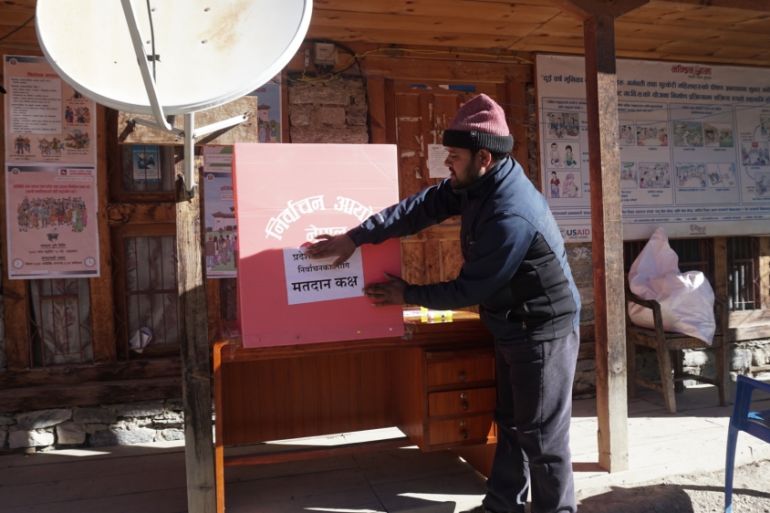Nepal votes in key general elections
Parliamentary and provincial assembly elections expected to lay groundwork for Nepal’s transition into a federal state.

Manang, Nepal – Polls closed in Nepal’s northern mountain districts as the country voted in the first parliamentary and provincial assembly elections since a new constitution became law two years ago.
More than three million voters were expected to cast their ballot, with some of the remote mountain areas recording sub-zero temperatures and snowfall. The Election Commission put the preliminary voter turnout at about 65 percent.
Keep reading
list of 4 itemsSolomon Islands prepares for ‘most important election since independence’
Six takeaways from first day of Trump’s New York hush money criminal trial
Manipur’s BJP CM inflamed conflict: Assam Rifles report on India violence
Commission spokesperson Nawaraj Dhakal said voting started at 7am and ended at 5pm (11:00 GMT).
The election is expected to lay the groundwork for Nepal‘s transition into a federal state. Nepal’s constitution, declared in September 2015, states the country is a federal democratic republic and the geographical area has been divided into seven states.
It was the first phase of the election, held in 32 districts in the hills and mountains. Complications in logistical management and the possibility of a harsh climate in the mountains mean the election has to be held in two phases, with the second slated for December 7 in 45 districts. November and December can be extremely cold, and most of the villagers travel down to warmer regions.
Political forces on the left – mainly Nepal’s Communist Party, Unified Marxist-Leninist and Nepal’s former Maoists – joined forces in early October and are running together against the “democratic alliance” of the Nepali Congress and the former monarchical parties.
The effect of the alliances can be seen even at 3,500 metres in Manang village. Because of its remoteness and distance from the capital, in the past, the community used to make unanimous decisions related to village issues. Now, mainstream politics have affected community dynamics, and locals have had to take sides.
“There are possibilities of scuffles between youth cadres of two political parties, ‘democratic alliance’ and left alliance. So far, it has been peaceful. We have deployed security forces to abort such situations,” the chief district officer of Manang said.
Election-related violence
More than 600 security forces have been deployed for Manang, out of 250,000 nationally. More than 17 people have been injured in election-related violence across the nation.
Manang district is in Province 4 and has the smallest electorate, with just 5,881 registered voters. Every vote counts and everyone here is related. Clanship rather than political ideology plays a big role, and tensions on the day before the election were high.
“I came here for two reasons: one, because I could not say no to my family. More than politics, I had to support my family member, who is a candidate. If he wins, I hope he develops the village,” said Shidi Gurung, 53, a distant relative of the candidate representing the left alliance.
!['I want to vote for the candidate who will develop this village and the district' [Smriti Basnet/Al Jazeera]](/wp-content/uploads/2017/11/950b7ccb24af4f45a3f794ff59101aa5_18.jpeg)
Cheta Gurung, who is related to the “democratic alliance” candidate, says that she came to support him so that he would develop the village. Since most of the villagers are related to each other, people are feeling the pressure: “Nobody should be forced to vote for one side or the other.”
Many of the voters from this district live in Kathmandu, and candidates have provided shuttle services for their supporters. Manang was recently connected by roads and hundreds have made the perilous journey. Voters have had to be shuttled back and forth to a lower altitude, as many have suffered altitude sickness.
One candidate will represent Manang in the house of representatives and two will be elected to represent the state assembly.
Ngopang Gurung, 79, who represented Manang back in the 1970s, has also come to vote.
“I could not just stay back. I want to vote for the candidate who will develop this village and the district – a candidate with wisdom and compassion, a love for the country. Such a candidate can do much when they get to power.”